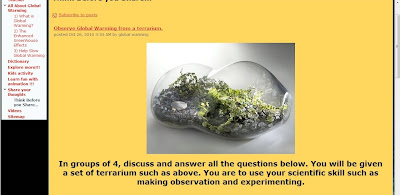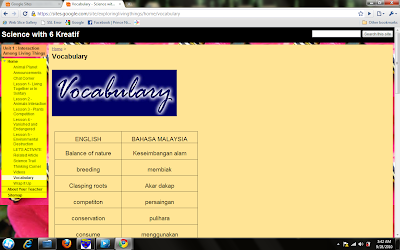
Today is 19 October 2010. This means, today the entire group has to present Web Tool chosen by each group. The presentation of the final project starts with our group. In the group, we have present each features and briefly explains about Google Site.
https://sites.google.com/site/glowar88/home
We tell audience about features of our group Google Site. The features are:
Home
About Your Teacher
All About Global Warming
2) The Enhanced Greenhouse Effects
3) Help Slow Global Warming
Dictionary
Explore more!!!
Kids activity
Learn fun with animation !!!
Share your thoughts
Think Before you Share...
Videos
Sitemap
Then, in group, we present each of the features by giving some examples. Here are some snapshots of our Google Site that we have design specifically about Global Warming for year 6 pupils.








The second presentation of the day: THE SOLAR SYSTEM (year 6)






Thunk group uses a blog a medium for sharing information and learning process takes place. I think the podcast used by this group is interesting and effective. The video is and the voice is clear. My personal comments would be perhaps, they can put some pictures in teh video so that pupils can see and analyze better.
Last, but not least : THE PHASES OF MOON (year 6)


Fatin’s group uses a blog to explain on the phases of moon. I find this blog interesting. I realize that blog also can be a medium for sharing information with pupils. My personal comments for this group is, I find that perhaps they can contextualize a video (which is foreign language) to meet with the Malaysian students who learn Science in English. Overall, I find the presentation of blog is well-plan and systematic.

In my opinion, I think Wiki is a tool that can be used as an effective medium for learning. The reasons are:

(1)Wikis are edited in a web browser. It doesn’t matter is a user is using a PC or a MAC or if they have a certain type of software. As long as a user can access the web they can access the wiki.
(2) Being able to access the wiki anywhere you have a web connection is another advantage all on its own. If a user is traveling then they don’t need to worry about bringing any files with them. They can simply log onto the wiki and have all the information they need.
(3) Emailing a large document to several people can take time and some people may not receive it due to spam filters. By using a wiki one user can share his or her work with all of the users at one time.
(4) Another advantage to using a wiki is that all the drafts of a document are saved. If a team of people have altered a document several times and feel that using the original introduction would now work better than the revised version, they can easily go back and retrieve the original.
(5) A wiki can be protected with a password so you don’t have to worry about the public viewing it.
(6) A wiki also gives the advantage of being able to put many ideas together and then going back to edit them when necessary or when time allows.
Example:
For example, you could use a wiki to keep track of all your outsourcing. A user account can be set up for all virtual assistants, ghostwriters, graphic designers, etc and a page can be created for each project. Then team members can provide input on what has been done on behalf of the project and what they still need to do.
(7) When communicating through a wiki there is no worry about emails getting lost or thrown away. All communications will be kept inside the wiki. Users can also upload files to the wiki, which is another great tool for collaboration. If a ghostwriter depends on a virtual assistant to assign article topics, they can simply upload them to the wiki. Everyone can access them at any time.
I notice and realize that ADDIE model really help me to plan a systematic in order to design and produce a material for learning.
By using ADDIE model, I can ensure:

(1) Learners will achieve the goals of the course,
(2) Allows for the evaluation of learner's needs,
(3) The design and development of training materials, and
(4) Evaluation of effectiveness of the training program using processes with specific, measurable outcomes.
I also realize that ADDIE model is practical to be used as guide to plan a good science lesson.
(1) Analysis Phase
In the analysis phase, I can ensure that the instructional problem is clarified, the instructional goals and objectives are established and the learning environment and learner's existing knowledge and skills are identified.
I can question myself :
Who are the learners and what are their characteristics?
What is the new behavioral outcome?
What types of learning constraints exist?
What are the delivery options?
What are the online pedagogical considerations?
What is the timeline for project completion?
(2) Design Phase
These are steps involved in design phase:
Apply instructional strategies according to the intended behavioral outcomes by domain (cognitive, affective, and psychomotor).
Design the user interface and/or user experience
I can think and plan of learning objectives, assessment instruments, exercises, content, subject matter analysis, lesson planning and media selection. At this phase, I can ensure the plan is systematic and specific. Systematic means a logical, orderly method of identifying, developing and evaluating a set of planned strategies targeted for attaining the project's goals. Specific means each element of the instructional design plan needs to be executed with attention to details.
(3) Development Phase
At this phase, I can make the content assets that were blueprinted in the design phase. In this phase, I can also design a storyboards and graphics. If e-learning is involved, I also can and/or integrate technologies.
(4) Implementation Phase
During the implementation phase, for the science lesson, I can ensure that I cover the course curriculum, learning outcomes, method of delivery, and testing procedures. Preparation of the learners includes training them on new tools (software or hardware) and student registration.
(5) Evaluation Phase
Finally, after I have carried out the science lesson, I can carry out with the evaluation phase consists of two parts: formative and summative. Formative evaluation is present in each stage of the ADDIE process. Summative evaluation consists of tests designed for domain specific criterion-related referenced items and providing opportunities for feedback from the users which were identified.
This is the last week of semester for the class. Here, I would like to thanks Professor Dr. Rohaida for her guidance in this subject PMEY 3104. Wish us luck and your prayer for our exam which is set on 22nd of November.
Thank you very much, Professor!
















